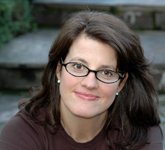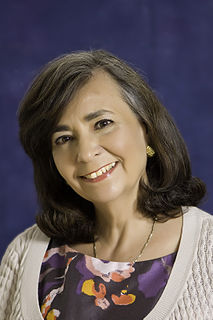A Quote by Jada Pinkett Smith
When I was growing up, my mother only put her foot down once: She said, 'You are going to college.' And that was a lifesaving moment. But she never talked to me about my clothes or hair. So I learned how to parent my kids through her.
Related Quotes
After my mother died, I learned that she'd had a scholarship to the University of Nebraska, but - in kind of a tradition that females don't do things like that - her father prevented her from going. She always said that she wasn't allowed to go to college, but until she died, I never knew that she'd had this scholarship.
And then she said nothing else, for Henry put his arms around her and kissed her. Kissed her in such a way that she no longer felt plain, or conscious of her hair or the ink spot on her dress or anything but Henry, whom she had always loved. Tears welled up and spilled down her cheeks, and when he drew away, he touched her wet face wonderingly. "Really," he said. "You love me, too, Lottie?
She remembered that once, when she was a little girl, she had seen a pretty young woman with golden hair down to her knees in a long flowered dress, and had said to her, without thinking, "Are you a princess?" The girl had laughed very kindly at her and asked her what her name was. Blanche remembered going away from her, led by her mother's hand, thinking to herself that the girl really was a princess, but in disguise. And she had resolved that someday, she would dress as though she were a princess in disguise.
Even her hair, she thought, running her fingers impatiently through the damp golden brown ringlets that curled romantically around her face. A Botticelli angel, a boy in college once called her, begging her to let it grow. Right! That was all she needed: wild curls cascading down her back like a doomed Shakespearian virgin, or a rock star.
My fourth mother, my godmother, she passed away a couple years ago - her name was Gwen. She was the theater director over at the gym where I grew up and learned about all those awesome things I told you about already. She was the one who taught me terms like "upstage" and "downstage," all those technical things about the art of what I do - how to breathe what I see, how to move. They were all her tactics, not anything learned or given to me through a theory, but rather by her natural abilities.
"Baby, you know?" my mother once said to me. "I think you're the greatest woman I've ever met - and I'm not including my mother or Mrs. Eleanor Roosevelt in that." She said, "You are very intelligent and you're very kind, and those two qualities do not often go together." Then she went across the street and got in her car, and I went the other way down to the streetcar. I thought, "Suppose she's right. She's intelligent - and she's too mean to lie." You see, a parent has the chance - and maybe the responsibility - to liberate her child. And my mom had liberated me when I was 17.
I talked to my mother about it a lot. I asked her what it was like to grow up in New York and Harlem in the 1920s and 1930s, and I asked her about a woman leaving her husband. I asked her about how she would feel about that woman, and my mother grew up in the Church Of God In Christ, and she told me that the woman might be isolated because the other women thought she might go and come after their husbands. That's how they thought then.
At 19, if a woman said no, no meant no. If she didn't say anything and she was open, and she was down, it was like how far can I go? If I touch her breast and she's down for me to touch her breast, cool. If I touch her lower, and she's down and she's not stopping me, cool. I'm going to kiss her or whatever. It was simply if a woman said no or pushed you away that was non-consent.
I sit on the couch watching her arrange her long red hair before my bedroom mirror. she pulls her hair up and piles it on top of her head- she lets her eyes look at my eyes- then she drops her hair and lets it fall down in front of her face. we go to bed and I hold her speechlessly from the back my arm around her neck I touch her wrists and hands feel up to her elbows no further.
SHE is neither pink nor pale, And she never will be all mine; She learned her hands in a fairy-tale, And her mouth on a valentine. She has more hair than she needs; In the sun ’tis a woe to me! And her voice is a string of colored beads, Or steps leading into the sea. She loves me all that she can, And her ways to my ways resign; But she was not made for any man, And she never will be all mine.
In the classics section, she had picked up a copy of The Magic Mountain and recalled the summer between her junior and senior years of high school, when she read it, how she lay in bed hours after she should have gotten up, the sheet growing warmer against her skin as the sun rose higher in the sky, her mother poking her head in now and then to see if she'd gotten up yet, but never suggesting that she should: Eleanor didn't have many rules about child rearing, but one of them was this: Never interrupt reading.
The cycle hit the beach and spun out. Emma went into a rolling crouch as she flew free of it, keeping her elbows in, pushing the air hard out of her lungs. She turned her head as she hit the sand, slapping her palms down to roll herself forward, absorbing the impact of the fall through her arms and shoulders, her knees folding up into her chest. The stars wheeled crazily overhead as she spun, sucking in her breath as her body slowed its rolling. She came to a stop on her back, her hair and clothes full of sand and her ears full of the sound of the wildly crashing ocean.
My mother lived her life through movies and books - she read everything there was to read. And she read to me every night. I never went to sleep without her reading to me. And she fantasized about the book and she would talk about it, the place, and you would think that after she read the book and after she told you stories about it, that she had actually been there. I learned about story from her, and I learned the value of a great story, and the value of great characters.


































